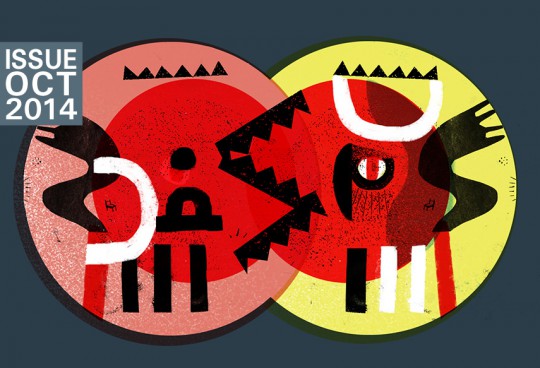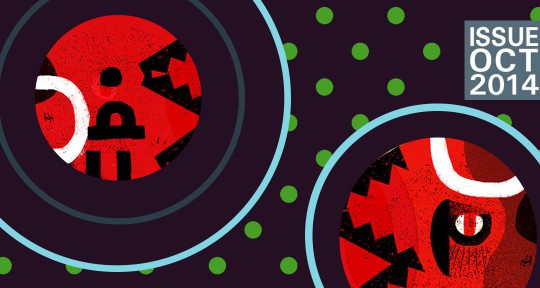Around this time, equipped with a new legal advisor (the extremely efficient Win Bassett), a small group is formally set up within our team to look into the feasibility of Asymptote becoming a non-profit organization in the USA. This makes most sense for tax-deductibility, since our largest readership, outnumbering the second largest demographic by a ratio of three to one, is American. It would take one and a half years for me to reach a definitive decision, but I decide in the end not to take the plunge. To become a non-profit, a board would first have to be formed, and all major decisions about the journal’s direction would have to be run by this board (which would mostly comprise Americans). Had I worked so hard for the magazine’s survival only to surrender its reins to others? Aren’t there already more than enough American mediators of otherness? I’m also wary because of what one board member of another online magazine has told me in confidence: being bound to a board has held that magazine back from reaching its full potential. We do, however, thanks to Win Bassett, Erin Stephens-North, Lynette Lee, and Eric M. B. Becker, succeed in acquiring fiscal sponsorship with Fractured Atlas on August 26, 2014. This is a breakthrough: For the first time, we are tax-deductible for American donors, removing one more barrier standing in the way of support. Here to introduce the Fall 2014 issue is Assistant Editor Erik Noonan.
Published in sync with the release of the inaugural episode of the Asymptote Podcast—whose producer Emma Jacobs suggests that the mythical stories we tell ourselves are really signs of “our inability to map our own minds”—the Fall 2014 issue of Asymptote sets the reader afloat through a tesseract located among the interlinked dimensions of spacetime.
In Shi Tiesheng’s “The Year of Being Twenty-One,” that mapless place masquerades in public life as a monotheistic deity: “I did see God, one day—but he went by a different name, and that name was the mind,” Shi writes. “In the hazy patches of science; in the chaos of destiny; you can only turn to your own mind. Everything we believe in—no matter what that might be—comes from the promptings and the guidance of our minds.”
Aram Kugiungian, the eponymous character of a short story by J. Rodolfo Wilcock translated here by Lawrence Venuti, notes “one April evening in 1949, on the sidewalk of a dirty street heading toward Lake Ontario” that “he was also someone else or, indeed, several others.” In Wilcock’s droll tale, poor Aram lacks the means to interpret his (in fact quite normal, even universal) condition any way except literally: “although in recent years he has multiplied himself exponentially, he has never wishes to meet any of his incarnations in person,” the story concludes. “Many of them do not speak English, others seem to be very busy, and, to tell the truth, he wouldn’t know what to say to himself.”
Also evident in the October 2014 issue is a strange conjunction of strife and mystery. Gregorz Wróblewski’s poem “Enhanced Interrogation Techniques,” translated by Piotr Gwiazda, emphasizes the corporate character of the contemporary global culture industry and its function as a channel for propagandistic messaging intended to normalize imperialist violence. The poem likens the widespread use of euphemism in mass media to the prevalence of undernourishment and cosmetic surgery among a bourgeoisified international upper class. It even includes the original Polish in a list of torture techniques to trenchant effect:
Tom Cruise decided only at the age of 39 to straighten his front teeth and
have them centered!
Later the CIA used additional “enhanced interrogation techniques”
which included: długotrwała nagość (prolonged nudity), manipulacje żywieniowe
(dietary manipulation), uderzanie po brzuchu (abdominal slap).
The presence of ambiguity and the unknown in everyday life is also the theme of “If Even the Spirit Child” by Mohammed Said Abdulla, beloved author of a popular series of novels about the exploits of the detective Bwana Msa, “the Sherlock Holmes of Unguja.” The story excerpted and translated here by Nathalie S. Koenings is set on the deck of the Dar Es Salaam / Unguja ferry, where our hero differentiates himself from his distinguished British predecessor by affirming to his interlocutor, a young man whose dream has come true, that “there’s something to our dreams, that dreams aren’t a foolishness at all, as so many of us imagine.”
 Likewise, from a different kind of dream, Klaus Rothstein, in “Flannery O’Connor’s Kiss of Death,” translated here by Katrine Øgaard Jensen, details a friendship and would-be romance with the great writer. “Although Flannery was both conventional and religious, we eventually became so close that she, while the car was parked, allowed me to kiss her,” Rothstein writes. “When I later read one of Flannery’s short stories, ‘Good Country People,’ I noticed that the main character was a travelling Bible salesman. I didn’t sell bibles, but I used to call my binder with the records of the publishing firm ‘my bible.’ Also, the salesman in the story is named Manley Pointer, which has an obvious erotic connotation.” In these pieces, what cannot be known nevertheless connects, by way of a myth, to what is known all too well.
Likewise, from a different kind of dream, Klaus Rothstein, in “Flannery O’Connor’s Kiss of Death,” translated here by Katrine Øgaard Jensen, details a friendship and would-be romance with the great writer. “Although Flannery was both conventional and religious, we eventually became so close that she, while the car was parked, allowed me to kiss her,” Rothstein writes. “When I later read one of Flannery’s short stories, ‘Good Country People,’ I noticed that the main character was a travelling Bible salesman. I didn’t sell bibles, but I used to call my binder with the records of the publishing firm ‘my bible.’ Also, the salesman in the story is named Manley Pointer, which has an obvious erotic connotation.” In these pieces, what cannot be known nevertheless connects, by way of a myth, to what is known all too well.
The poem “Hemispheres” by María do Cebreiro similarly portrays a connection between two people that is curiously both oblique and profound:
—He was in a hurry and I was hungry.
We’d been out all day.—You said you didn’t like him.
—I said he was difficult.To really listen to her, you had to
interrupt.Sometimes she closes her eyes.
—Do you find difficultness seductive?
—I find distance seductive.
Even at a distance, the Fall 2014 issue of Asymptote demonstrates an exceptional thematic cohesion across genre, language, location, and time. Although four years have passed since its publication, its myths provide diversion and edification by transporting us to distant dimensions.
Erik Noonan is an Assistant Editor at Asymptote.
Find the Fall 2014 issue here. American readers are additionally invited to explore our Fractured Atlas page here and to join 275 past donors in making a one-time contribution!
*****
Read more from our #30issues30days showcase:
- Summer 2014: The Tip of a Vast Iceberg
- Spring 2014: The Space Between Languages
- Winter 2014: A Rookie Among Giants
- Fall 2013: Translators Talk to Us
- Winter 2011: Asymptote‘s Origin Story

